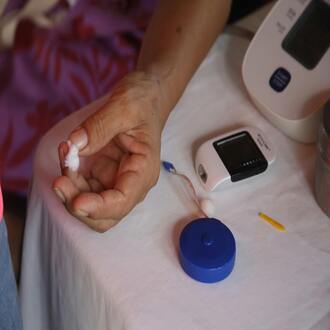Transcription Vitamins in geriatric nutrition
Old age is a stage of life that brings with it significant changes in the health and well-being of individuals. One of the most important aspects of health at this stage is nutrition, and in particular, adequate vitamin intake.
As we age, our nutritional needs change, and vitamins play a crucial role in maintaining good health. In this session, we will explore the importance of vitamins in the elderly and how they can contribute to the well-being of older people.
The changing needs for vitamins in later life
As we age, our bodies experience changes in metabolism and nutrient absorption. This means that the nutritional needs of older people are different from those of younger people. Vitamins become even more crucial at this stage of life, as they can help make up for deficiencies that are often present in the diets of older adults.
Vitamin D and Calcium for Bone Health
One of the most common concerns in the elderly is bone health. Vitamin D and calcium play a key role in maintaining strong bones. Calcium absorption declines with age, which can increase the risk of fractures. Vitamin D and calcium supplements may be recommended by a geriatrician to ensure good bone health.
Vitamin B12 for cognitive function
Vitamin B12 is essential for cognitive function and the nervous system. B12 deficiencies are more common in older people due to absorption problems. Lack of this vitamin can cause memory problems and confusion. Therefore, it is important to ensure adequate B12 intake through diet or supplements.
Vitamin C and antioxidants for cardiovascular health
Vitamin C and other antioxidants play an important role in protecting cells and cardiovascular health. As we age, the risk of heart disease increases. Consuming foods rich in vitamin C and antioxidants, such as fruits and vegetables, can help reduce this risk and promote good cardiovascular health.
Vitamin A and eye health
Eye health is another critical aspect of aging. Vitamin A is essential for maintaining good vision, especially in low light conditions. Older people often experience vision problems, such as cataracts and macular degeneration. A diet rich in vitamin A and other antioxidants can help preserve eye health.
Vitamin E and the fight against cellular aging
Vitamin E is known for its antioxidant properties and its ability to protect cells from oxidative damage. As we age, our bodies become more susceptible to oxidative stress, which is linked to cellular aging and the development of chronic diseases. Consuming foods rich in vitamin E can help slow this process.
Consultation with a health professional
While it is important to recognize the importance of vitamins in the elderly, it is equally crucial to note that nutritional needs may vary from person to person. Therefore, it is advisable for seniors to consult a healthcare professional, such as a geriatrician or dietitian, to assess their individual needs and receive personalized vitamin supplementation and dietary recommendations.
vitamins




